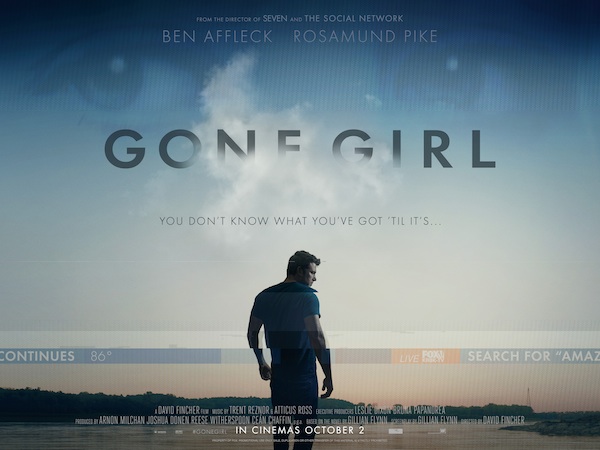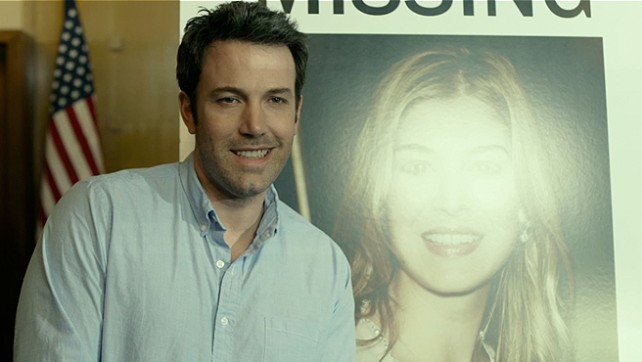Genre: Drama – Thriller
Premise: When a man’s wife goes missing, he finds himself quickly becoming the number 1 suspect.
About: Gone Girl was a hugely popular book that sold millions of copies. The author, Gillian Flynn, sold the rights to 20th Century Fox and, soon after, the great David Fincher came on to direct. It opened this weekend at number 1 (barely holding off horror flick “Annabelle”) with 38 million dollars. Flynn wrote 1000 word blurbs about movies for Entertainment Weekly for 10 years before she found literary success. After reading Gone Girl, which gets into the minutia of a woman wanting her husband to suffer for the rest of his life, Gillian’s husband asked her if they needed to have a talk. Gillian assured him that no, everything she wrote was fiction (yeah right). Believing she had to strip everything out of the book to keep the movie lean, she found that when she gave her first draft to Fincher, he actually wanted to put a bunch of stuff back in. So the script went from lean, to beefing back up again.
Writer: Gillian Flynn
Details: Script (135 pages) Film (149 minutes!)
In a rare move, Gillian Flynn, author of the book, “Gone Girl,” was chosen by the studio to adapt her own work. Usually, this kind of thing doesn’t happen. Novelists are prone to writing from inside the character’s head, going on and on about details, details that work in the context of a novel, but that would cripple a typical screenplay.
For example, whereas a novelist might explain how a character is feeling before she approaches a man, a screenwriter must find a way to convey that feeling visually. So a two page inner monologue where a girl lays out her nerves in exquisite detail probably becomes a simple bobbling and dropping of her phone – a physical way to show nervousness. This is what screenwriters mean when they say, “Show, don’t tell.”
My biggest curiosity going into Gone Girl, however, was how Flynn would handle the ending. In my opinion, the ending of Gone Girl turned what should’ve been one of the best books of our generation into a great big missed opportunity. Would Fincher keep this ending or change it? He had as good of an excuse as any. Movies need to move. We don’t have time for long endings. And there were rumors that he was doing just that. So how would they change it? Would he turn a disaster climax into a classic?? I had to know!
For those who don’t know the plot to Gone Girl, it’s about Nick and Amy, a marriage that looks perfect from the outside, but on the inside is anything but. When Amy goes missing, and there are signs of struggle in Nick and Amy’s house, Nick does what any concerned husband would do. He calls the cops. But early on in the investigation, Nick realizes that he’s becoming the lead suspect. Soon the media catches on, implicating Nick as a classic sociopath killer, and Nick finds himself to be the most hated man in America. Even we start to wonder… did Nick do it?
To appreciate Gone Girl, one must first realize how it’s different. I mean we’ve seen plenty of movies with disappearing women. That’s been done before. So how do you find a new angle?
The primary difference with Gone Girl is that it shows BOTH SIDES of the story. We’re not just in Nick’s shoes. We slip inside the shoes of Amy also. Nick’s half deals with the present, and Amy explains the past. Eventually, Amy catches up to the present, and we keep the back and forth going.
This was brilliant because it upset the typical narrative everyone is used to – the one that’s easy to predict. When you walk out of movies and say, “Ehh, that was okay I guess,” it’s usually because the writer didn’t do anything fresh, give you anything different. This movie thrives off its unique structure, which keeps you guessing.
Flynn’s film is also an argument for the power of twists. There’s lots of little twists and turns here that keep you off balance. Nick secretly has a girlfriend. Amy buys a gun because she’s scared of Nick. And that famous twist at the midpoint where we find out that Amy’s been lying this whole time. Gone Girl really keeps you off guard, and so does a tremendous job of keeping you guessing.
Then there’s the scope of the movie. I’m always fascinated by the question, “What makes an idea a movie idea?” Cause you can’t throw any old idea on the page and call it a movie. It has to be a big enough idea to be “worthy” of spending millions of dollars. Especially these days, when more and more scaled-down films are going straight to Itunes.
So what Flynn did, whether she intended for this to one day be a movie or not, is she increased the scope of the missing woman narrative. Instead of keeping it local, it becomes national. It isn’t just the people in town who are suspicious of Nick. It’s the whole damn nation! That’s what made this big enough to be a movie. How important of a choice was that? David Fincher doesn’t make this movie if it’s contained to a single town.
Regardless of all these positives, everything comes back to that ending. While a lot of people loved the book, one only need go to Amazon and click on the “one star” reviews to see how pissed off people are about the ending.
So did they change it for the film?
Are you ready for the answer? Are you sitting down?
No, they did not. ☹
And it makes what could’ve been a classic film more of a brilliant curiosity.
So what’s the beef? What was so “wrong” about the ending? Well, in the film, the evidence piles up against Nick. Every 15 movie minutes, his situation is twice as worse as it was. It’s really looking bad for him. So we’re really eager to see how he’s going to get out of this, how he’s going to “beat” Amy. Then, just as the American public is about to lynch him…. Amy comes back! Claiming to have been held captive and abused by her crazy ex-boyfriend (which we know, from watching her, is only partly true). And just like that, Nick’s nightmare is over.
Okay, not the ending I was anticipating. But whatever. It is what it is. The End. Right?
Uhhhh, no.
Not even close to the end. We actually stay with Nick and Amy for another 20 minutes, as Amy kinda/sorta bullies Nick into staying with her. She even pretends to be pregnant (or maybe really is pregnant – we don’t know), in order to cajole Nick into sticking around forever.
This ending doesn’t work for two reasons.
The first one is that the film hung around long after the party was over. Since we’re on the topic of parties, I want you to imagine a balloon. Each time you up the ante for your character, you’re puffing up the balloon. Nick is caught cheating with a younger woman. That’s a puff. Nick is caught smiling next to his missing wife’s picture. Another puff. He’s caught taking a selfie with a “fan.” Another puff. He’s forced into hiring a lawyer, making everyone think he’s guilty. Another puff.
The great part about watching a film is watching that balloon get bigger and bigger until we can’t take it anymore! It’s too big! It has to pop! And when it does (i.e. the moment Luke destroys the Death Star), ALL THAT AIR is released. This is why, after the balloon pops, you usually get only one or two more scenes in the movie. There’s no more air left in the balloon, so the audience has no real reason to be there anymore.
The fault of Gone Girl is in popping its balloon (by Amy coming home), and then thinking we’ll want want to stick around for more. Not only are we exhausted from watching that balloon blow up for so long, but no amount of air you can blow into this new balloon is going to equal how big that other balloon got. In storytelling, you always want your story to get bigger (to BUILD). The second it goes backwards and gets smaller, you’ll find yourself an audience that’s losing interest.
On top of this, Amy showing up gets Nick out of trouble without him having to do anything. I HATE that. I think it’s the laziest kind of writing there is – handing your hero the solution. A hero should always have to EARN the solution. That’s why we watch movies, to see the hero solve the problem. I mean imagine if in Silence of the Lambs, Buffalo Bill showed up at Clarice’s desk and said, “I’m sorry for causing all this trouble. I turn myself in.” THAT’S THE EQUIVALENT OF WHAT HAPPENED IN GONE GIRL! Nick is dead in the water and…. HIS WIFE SHOWS UP AND SAVES HIM??? It’s just a really convenient choice and it shows the workings of a writer who gave up, who didn’t work hard enough to come up with something better.
Despite this, I thought Fincher did a great job with what he was given. Even with all that air leaking out of the balloon, he shot those last 20 minutes like a demented backwards fairy tale and made them so uneasy and weird that you kind of went with it. That’s why this guy is at the top of every studio’s directing list. He almost made a terrible story choice work.
And if you take away that ending, the rest of the movie was pretty awesome. Ben Affleck (despite being autistic) was well-suited for the role. Rosamund Pike was appropriately weird and scary. The female cop was good. The sister was good. Maybe the most shocking standout was Tyler Perry, who says that he’d never heard of David Fincher before this film (what???). He was so good as the all-star lawyer, I wish they would’ve found a way to give him more screen time.
So yeah, despite that ending, I still enjoyed Gone Girl. It’s a different take on a familiar subject matter, and it does most of it right. I’m curious though, for those who didn’t read the book, what did you think of the ending? Did you like it? If so, why? I knew it was coming so I was prepared for it but I want to know how it played just as a movie.
[ ] what the hell did I just watch?
[ ] wasn’t for me
[xx] worth the price of admission
[ ] impressive
[ ] genius
What I learned: Everyone has their own writing routine. There is no “right” way so don’t feel bad if you’re not doing the same thing as Aaron Sorkin. For example, while a lot of writers will say that you need to be writing all the time, Flynn approaches it a little differently: “I’m a staunch believer in pottering about—I’ve had some of my best writing epiphanies when I’m doing things that have nothing to do with writing. So I may play a round of Ms. Pac-man or Galaga…” There’s nothing quite like sitting down and banging out pages, but for some writers, walking around, procrastinating, thinking of the script in an abstract sense, is the best way to go. As long as your script is in the back of your head, you never know when the next great idea for it will strike.



